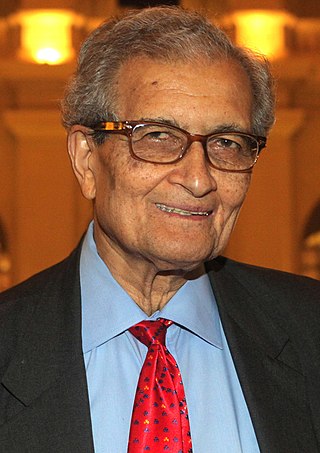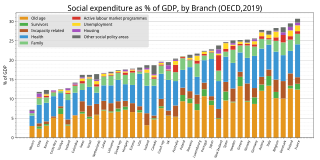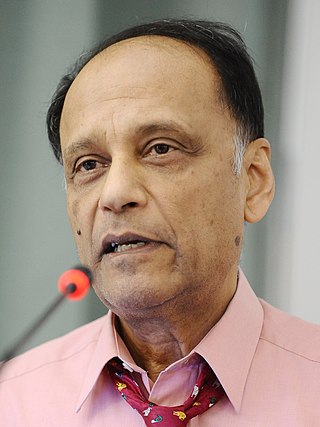
The University of Gothenburg is a university in Sweden's second largest city, Gothenburg. Founded in 1891, the university is the third-oldest of the current Swedish universities and, with 37,000 students and 6,000 staff members, it is one of the largest universities in the Nordic countries.

Amartya Kumar Sen is an Indian economist and philosopher, who since 1972 has taught and worked in the United Kingdom and the United States. Sen has made contributions to welfare economics, social choice theory, economic and social justice, economic theories of famines, decision theory, development economics, public health, and measures of well-being of countries.
Good governance is the process of measuring how public institutions conduct public affairs and manage public resources and guarantee the realization of human rights in a manner essentially free of abuse and corruption and with due regard for the rule of law. Governance is "the process of decision-making and the process by which decisions are implemented ". Governance in this context can apply to corporate, international, national, or local governance as well as the interactions between other sectors of society.

A welfare state is a form of government in which the state protects and promotes the economic and social well-being of its citizens, based upon the principles of equal opportunity, equitable distribution of wealth, and public responsibility for citizens unable to avail themselves of the minimal provisions for a good life.

Ernst Johannes Wigforss was a Swedish politician and linguist (dialectologist), mostly known as a prominent member of the Social Democratic Workers' Party and Swedish Minister of Finance. Wigforss became one of the main theoreticians in the development of the Swedish Social Democratic movement's revision of Marxism, from a revolutionary to a reformist organization. He was inspired and stood ideologically close to the ideas of the Fabian Society and guild socialism and inspired by people like R. H. Tawney, L.T. Hobhouse and J. A. Hobson. He made contributions in his early writings about industrial democracy and workers' self-management.

Sir Partha Sarathi Dasgupta is an Indian-British economist who was Frank Ramsey Professor of Economics at the University of Cambridge, United Kingdom, and a fellow of St John's College, Cambridge.

Sir Leonard Valentinovich Blavatnik is a Ukrainian-born American-British business magnate and philanthropist. As of March 2022, Forbes listed his wealth at $35.4 billion, making him somewhere between the 20th- and 33rd-richest person in the world. In 2017, Blavatnik received a knighthood for services to philanthropy.

Paul Pierson is an American professor of political science specializing in comparative politics and holder of the John Gross Endowed Chair of Political Science at the University of California, Berkeley. From 2007-2010 he served at UC Berkeley as Chair of the Department of Political Science. He is noted for his research on comparative public policy and political economy, the welfare state, and American political development. His works on the welfare state and historical institutionalism have been characterized as influential.

Barbara Czarniawska is an organization scholar.

Ngaire Tui Woods CBE is the founding dean of the Blavatnik School of Government and professor of Global Economic Governance at the University of Oxford. She founded the Global Economic Governance Programme and is the co-founder of the Oxford–Princeton Global Leaders Fellowship programme. She was born in New Zealand.

Kotaro Suzumura was a Japanese economist and professor emeritus of Hitotsubashi University and Waseda University. He graduated from Hitotsubashi University in 1966. His research interests were in social choice theory and welfare economics. He was also a Fellow of the Econometric Society. He was named a Person of Cultural Merit in 2017.

The Blavatnik School of Government is a school of public policy founded in 2010 at the University of Oxford in England. The School was founded following a £75 million donation from a business magnate Len Blavatnik, supported by £26 million from the University of Oxford. It is part of Oxford's Social Sciences Division, which aims to train current and future leaders in the practice of government.

Röhss was a family of merchants in the city of Gothenburg, Sweden, noteworthy through their significant donations to several local and national institutions.

Stewart Martin Wood, Baron Wood of Anfield is a Labour life peer in the House of Lords.
The Quality of Government (QoG)-Institute is an independent research institute at the University of Gothenburg.
Staffan I. Lindberg, is a Swedish political scientist, Principal Investigator for Varieties of Democracy (V-Dem) Institute and Director of the V-Dem Institute at the University of Gothenburg. He is a professor in the Department of Political Science, and member of the Board of University of Gothenburg, Sweden member of the Young Academy of Sweden, Wallenberg Academy Fellow, Research Fellow at the Quality of Government Institute; and senior advisor for the Oslo Analytica.
Karthik Ramanna is Professor of Business & Public Policy and Director of the Master of Public Policy Program at the University of Oxford’s Blavatnik School of Government, where he established the leadership curriculum on building trust across divided communities.
Peter Anthony Kemp, FAcSS is a social scientist.

Sven H. Steinmo is a professor of political science at the University of Colorado, Boulder. He obtained his BA from the University of California, Santa Cruz, and his MA, MPH, and PhD from the University of California, Berkeley. His primary teaching and research interests are in the realm of institutional theory, comparative public policy, and comparative historical analysis. Steinmo has also researched how political and economic institutions grew and currently operate within various developed democracies, such as Sweden and Japan, while utilizing the perspectives found in evolutionary theory. He is widely recognized for his work in institutional theory, having been one of the founders of the subfield of historical institutionalism. His book with Kathleen Thelen, Structuring Politics: Historical Institutionalism and Comparative Analysis (1992), is academically notable, and is a significant contribution within that domain of research.
Pepper Dagenhart Culpepper is an American political scientist.














